life as a US pro in Azerbaijan and the Faroes - The Guardian

What's it like to play professionally in soccer backwaters? Matthew Hall speaks to three of the almost 150 Americans pursuing a career thousands of miles from home.
For every Geoff Cameron in the PremierLeague there's a Michael Bradley in Major League Soccer. Two talented players in their prime, one playing in the coveted Premier League and the other trading the heights of Europe with Roma for the expansive suburbs and big money on offer in Toronto. (You mean Bradley went to Canada to win trophies?) What's less well known is that almost 150 Americans are contracted to professional clubs around the world, from Germany to Israel to Azerbaijan and many other places in between. We spoke to three American players trying to make their name a long way from home:
Let's get this out of the way early. Mayowa Alli has eaten whale. He's eaten whale jerky and barbecued whale. When you live on an isolated island in the North Atlantic, it's what you do.
"Some people would say eating whale is barbaric but I learned to look at it from their perspective," Alli says. "I only had it once. I can't give you a sophisticated review – but it was good."
Alli plays indefence for KI Klaksvik, a team in the Faroe Islands Premier League, and has a track record in adapting to new surroundings. Born in Nigeria, his family moved to the US when he was four, and he grew up in Lanham, a small Maryland town between Washington DC and Baltimore. "I thought eating goat meat was normal until I went to elementary school and everyone else told me it was weird," he says.
A talented high school soccer player, Alli was recruited by Bucknell University in Pennsylvania and named all-American in 2013 by the National Soccer Coaches Association of America. His college coach said Major League Soccer teams were interested. The league'sSuperdraft , where college players are called up to pro teams, beckoned. But Alli didn't get a call.
"The draft system is a bit weird," he explains. "In the major US sports it has been so successful but MLS is not always like that. They're picking foreign players and the college system is not the league base."
Alli had a choice. Stay home in America, cool his heels on a pro career, and put his political science degree to use – or look abroad. Then Bucknell alumni Conor O'Brien, playing professionally in Denmark, joined some dots, and Alli boarded a plane for Copenhagen.
On his first day in Denmark, Alli trialed with the reserve team of a third-division club – a long way from the European glamor portrayed by the Champions League on TV. He was offered a contract, joined first division (second-tier) club Vendsyssel the followingseason, before he was sent on loan to KI Klaksvik in the Faroe Islands' 10-team Premier League.
The Faroe Islands are an archipelago in the Norwegian Sea with a population of around 50,000. Klaksvik is the second-biggest city – actually, town – with a population of just over 4,000. The capital, Torshavn (literally "Thor's Harbor"), claims 13,000 inhabitants.
"If you're walking down the street and you see someone's grandmother, you say hi," says Alli. "You don't buy your fish from the supermarket. You get it from a fisherman. If you need something fixed, you call your uncle. If you need something sewn, you call your grandmother."
Still, while playing pro soccer in the Faroe Islands may appear off the beaten path, Alli says he's learned things he doubts he would have picked up in the US. "You get here and learn so much," he says. "There are some basic things players get here at a young age that I'm learning when I'm 22 years old. Imagine if I'd learned this when I was 16 or 17?"
Mikkjal Thomassen,Klaksvik's 40-year-old coach, says Alli has worked hard to inject what he calls
an 'holistic approach' to his football. "For us, a central defender is not just a defender," Thomassen says. "We put a lot of responsibility to build the play as well. Mayowa is exceptional in his physical capacity – his ability to jump and strength and courage. That is his force. He is at the international level for that."
Faroe Islands teams can field four foreign players. Many come from Denmark or Eastern Europe and are either starting careers or ending them. A top import can make around $6,000 a month, with a car and housing thrown in. Other players earn closer to $3,000.
Game day attracts almost 3,000 people to the team's stadium which is almost more people than the official population of the town. KI Klaksvik also has a successful women's team. Imagine Friday Night Lights set on an isolated island between Norway and Iceland.
"The team has a huge impact on daily life, and they say that the factories can that measure people work harder when we win," says Thomassen, who was the Faroe Islands' police chief of narcotics for 15 years before becoming a full-time football coach. Last year, Alli also worked part-time as a carpenter. "You can't just have one occupation in the Faroes," adds Thomassen.
The league doesn't just attract international players from Europe. Last season, Alli's teammates also came from Nigeria, Cameroon, and Senegal.
"Sometimes I'd go over to their house and eat west African food," Alli says. "I was surprised they could get the ingredients but they found some. There was a Nigerian guy who owned a pizza shop here. You'll never know what you'll find when you go around the world."
Alli's loan deal with KI ends in December. If the team finishes in the top four, (they're currently top of the table) there's a chance to qualify for the Europa League. Alternatively, Alli, now 24, will return to Denmark.
"Some players are maybe afraid of being in a whole new world," Alli says. "But you are young and you will never know what'll happen. It's worth a shot. If the football doesn't work out for you, it is still a great experience to have."
Adan Coronado, AZAL, Baku, Azerbaijan
Adan Coronado grew up in Hawaiian Gardens, California, south of Los Angeles and not far from Huntington Beach. These days, though, Coronado lives in Baku, the capital of Azerbaijan, on the Caspian Sea. Baku and the Caspian Sea are not known for sun and surf. In fact, Baku roughly translates to "wind-pounded city".
"I was like: 'Oh, where's Azerbaijan?'" Coronado recalls when he learned AZAL, a team in Azerbaijan's Premier League, was interested in signing him. "I went on Google and said: 'Where's this place at?!' I saw it was under Turkey: 'Oh, it's a little further out from home. It's way over the pond.'"
AZAL is the latest stop on something of a tour of professional soccer's lesser known leagues for Coronado. Blooded into the game by his Mexican-born father, Coronado (now 26) was an accomplished high school player but shunned the traditional college pathway in favor of, effectively, a talent show.
Handing over $300, he entered a combine – a kind of America's Got Soccer Talent – in Los Angeles. Players that made a cut were not invited to Hollywood but offered an expenses-paid trip to Germany as part of an 18-man squad to play matches against local teams. The hope was to
be be spotted by a European agent or a scout, or, well, anybody .
"I always had a curiosity to play overseas if I had the chance," Coronado says. "When the combine came up I thought, 'OK, this is the way I can get there'. I took the chance and left everything – college, family. I was 21 years old. As a soccer player, if you want to be a professional, that was late. But I thought, I'm not going to lose anything, so why not?"
In Germany, the midfielder was subsequently invited to trial with several clubs and offered a contract with Kickers Emden in Germany's third tier. "It was a traditional club, well organized, and with a fanbase," Coronado says. However, it was also a club with serious financial problems and dropped into Germany's (effectively, amateur) fifth tier.
"I was a little surprised," admits Coronado.
But not perturbed. Friends of friends of friends put him in contact with clubs in Montenegro and Bosnia-Herzegovina, where he played for two seasons. The professional dream was still alive. Then came the call from Baku.
"I didn't know this guy, so at first it was kind of sketchy," Coronado says of the sometimes shadowy world of agents and contracts. "They introduce themselves, but you don't know who they are, so it is risky. You don't know who you are talking to, sometimes."
Today, almost a year later, Coronado is proudly the only Mexican-American playing in Azerbaijan's eight-team Premier League. "I was the first one!" he laughs. When he arrived in Baku the club produced a mini-documentary on him. "They were like, what's going on?! They filmed me and wanted to know about my culture. Mexican-American is different here."
Coronado's non-Azerbaijan team-mates are Georgian, Chinese, and Iranian. "Not that many people speak English here – it's Turkish and Russian," he says.
As a kid, Coronado's favorite player was Manchester United's Eric Cantona. He'd watch games from Europe on TV at home in California. His father would talk about the games and how soccer in Europe was different to America. "I wanted to see that and experience that," Coronado says.
Butreality is a little different to the glamor of TV images – and not just geographically. "At first I had to just get by with the little salary they provide," Coronado explains. "They help you out with housing and the little I earned I'd spend on food, and the rest I'd save for a trip back home. That's how it starts off in the lower leagues. Everyone who is here in Azerbaijan wants to go to England, Spain, France, or Germany. They are looking to get out."
Away from his family – "They haven't visited yet, they're always working, you know how it is" – and his girlfriend, Coronado spends his downtime running a newly-launched fashion label with a teammate. With an eye on his post-soccer career, the label – called Left1 – pitches designer T-shirts as the kind of clothes pro soccer players wear.
"I will come back home eventually, but I want to explore the world and learn about different cultures," Coronado says. "Maybe I should be comfortable and have a stable life, but I want to learn and take away things from the world. Every time I go back home they say: 'Are you going to stay this time?' I say: 'No, maybe next time'."
Shaquell Moore, Atletico Levante, Valencia, Spain
For Shaquell Moore, the worst part was not getting paid. For five months. And not just the American teenager. The entire team did not get paid for almost half a season. Welcome to life in Europe as a professional player.
"The Spanish guys had family here and had someone to lean on, but I had to stand by myself," Moore recalls of his first season in Spain. "But to be honest, I don't think I've ever been in a better locker room. Everyone stayed positive and helped each other. It was bad but it was good. It helped me a lot. I know I'm able to tough it out even when I wanted to drop everything and go back home."
Moore, 19, has football in his blood. His father Wendell played for Trinidad & Tobago, representing his country three times during a qualification campaign for the 1986 World Cup. (Canada joined hosts Mexico asConcacaf's representatives in the finals). Growing up in Florida and Georgia, Shaq Moore was a rising star with US national youth teams, captaining the under-17 side, playing for the under-20s at the 2015 World Cup in New Zealand, and winning a Major League Soccer contract with FC Dallas.
"The traditional pathway is that you go to high school, you go to college and start a career there," Moore explains. "I thought I had the ability to skip college and test the waters overseas. I have nothing against MLS, the league is growing, but I wanted to try Europe."
Playing with the US under-18 team in the 2014 Copa del Atlantico, a friendly tournament in the Canary Islands, Moore attracted interest from Spanish scouts. A release from Dallas after just four months opened the door wider. Mooretooks trials at Valencia, Levante, and Huracan.
"You enter an environment where you don't really know anyone and you are basically coming in to take someone's spot," Moore explains of trialing at professional clubs. "They don't want to give you the ball and they don't want you to shine."
Still, Moore won a contract with Huracan, a team in Spain's third tier, but the club soon hit financial problems that would ultimately lead to its demise as a professional club in late 2015. Moore then won a deal with Real Oviedo, playing for its reserve team, before he signed with Levante at the end of the recent August transfer window.
"Huracan, and not getting paid, was one of the times when I asked, do I really want to be here?" Moore says. "But those experiences do make you stronger."
Moore as dropped off the national team radar after signing for Huracan and not playing for its first team. Speaking via phone from Valencia (after taking a Spanish lesson), he says he has no regrets about shunning MLS and moving to Europe. His education is not just tied to language classes.
"The culture here is soccer, soccer, and soccer," he explains. "The people are crazy about it and everyone is enthusiastic – even at the reserve team games. Spain is a soccer country.
"The other difference with the US is the technical ability of the players. At home, the focus is on bigger players and who can run the fastest and be the most physical. Here, you can be physical but you also have to have a brain for the game and good technique. It's more competitive because there are a lot of players and everyone is good. Even in the lower divisions."
Moore has signed a two-year deal with Levante. His plan is to break into the Levante first team (they currently plays in the second tier while the reserve sideplay in the third) and recapture the attention of the US national team. He jokes that he won't say he's taking it one day at a time. Two years at a time? That's different. By 2018 he'll be 21. A two-year deal with a professional team in Spain is kind of like college
– but very different.
"Everyone here in Spain is fighting to make it to the top," he says. "Here it's soccer or nothing."
www.ann.az
For every Geoff Cameron in the Premier
Let's get this out of the way early. Mayowa Alli has eaten whale. He's eaten whale jerky and barbecued whale. When you live on an isolated island in the North Atlantic, it's what you do.
"Some people would say eating whale is barbaric but I learned to look at it from their perspective," Alli says. "I only had it once. I can't give you a sophisticated review – but it was good."
Alli plays in
A talented high school soccer player, Alli was recruited by Bucknell University in Pennsylvania and named all-American in 2013 by the National Soccer Coaches Association of America. His college coach said Major League Soccer teams were interested. The league's
"The draft system is a bit weird," he explains. "In the major US sports it has been so successful but MLS is not always like that. They're picking foreign players and the college system is not the league base."
Alli had a choice. Stay home in America, cool his heels on a pro career, and put his political science degree to use – or look abroad. Then Bucknell alumni Conor O'Brien, playing professionally in Denmark, joined some dots, and Alli boarded a plane for Copenhagen.
On his first day in Denmark, Alli trialed with the reserve team of a third-division club – a long way from the European glamor portrayed by the Champions League on TV. He was offered a contract, joined first division (second-tier) club Vendsyssel the following
The Faroe Islands are an archipelago in the Norwegian Sea with a population of around 50,000. Klaksvik is the second-biggest city – actually, town – with a population of just over 4,000. The capital, Torshavn (literally "Thor's Harbor"), claims 13,000 inhabitants.
"If you're walking down the street and you see someone's grandmother, you say hi," says Alli. "You don't buy your fish from the supermarket. You get it from a fisherman. If you need something fixed, you call your uncle. If you need something sewn, you call your grandmother."
Still, while playing pro soccer in the Faroe Islands may appear off the beaten path, Alli says he's learned things he doubts he would have picked up in the US. "You get here and learn so much," he says. "There are some basic things players get here at a young age that I'm learning when I'm 22 years old. Imagine if I'd learned this when I was 16 or 17?"
Mikkjal Thomassen,
Faroe Islands teams can field four foreign players. Many come from Denmark or Eastern Europe and are either starting careers or ending them. A top import can make around $6,000 a month, with a car and housing thrown in. Other players earn closer to $3,000.
Game day attracts almost 3,000 people to the team's stadium which is almost more people than the official population of the town. KI Klaksvik also has a successful women's team. Imagine Friday Night Lights set on an isolated island between Norway and Iceland.
"The team has a huge impact on daily life, and they say that the factories can that measure people work harder when we win," says Thomassen, who was the Faroe Islands' police chief of narcotics for 15 years before becoming a full-time football coach. Last year, Alli also worked part-time as a carpenter. "You can't just have one occupation in the Faroes," adds Thomassen.
The league doesn't just attract international players from Europe. Last season, Alli's teammates also came from Nigeria, Cameroon, and Senegal.
"Sometimes I'd go over to their house and eat west African food," Alli says. "I was surprised they could get the ingredients but they found some. There was a Nigerian guy who owned a pizza shop here. You'll never know what you'll find when you go around the world."
Alli's loan deal with KI ends in December. If the team finishes in the top four, (they're currently top of the table) there's a chance to qualify for the Europa League. Alternatively, Alli, now 24, will return to Denmark.
"Some players are maybe afraid of being in a whole new world," Alli says. "But you are young and you will never know what'll happen. It's worth a shot. If the football doesn't work out for you, it is still a great experience to have."
Adan Coronado, AZAL, Baku, Azerbaijan
Adan Coronado grew up in Hawaiian Gardens, California, south of Los Angeles and not far from Huntington Beach. These days, though, Coronado lives in Baku, the capital of Azerbaijan, on the Caspian Sea. Baku and the Caspian Sea are not known for sun and surf. In fact, Baku roughly translates to "wind-pounded city".
"I was like: 'Oh, where's Azerbaijan?'" Coronado recalls when he learned AZAL, a team in Azerbaijan's Premier League, was interested in signing him. "I went on Google and said: 'Where's this place at?!' I saw it was under Turkey: 'Oh, it's a little further out from home. It's way over the pond.'"
AZAL is the latest stop on something of a tour of professional soccer's lesser known leagues for Coronado. Blooded into the game by his Mexican-born father, Coronado (now 26) was an accomplished high school player but shunned the traditional college pathway in favor of, effectively, a talent show.
Handing over $300, he entered a combine – a kind of America's Got Soccer Talent – in Los Angeles. Players that made a cut were not invited to Hollywood but offered an expenses-paid trip to Germany as part of an 18-man squad to play matches against local teams. The hope was to
"I always had a curiosity to play overseas if I had the chance," Coronado says. "When the combine came up I thought, 'OK, this is the way I can get there'. I took the chance and left everything – college, family. I was 21 years old. As a soccer player, if you want to be a professional, that was late. But I thought, I'm not going to lose anything, so why not?"
In Germany, the midfielder was subsequently invited to trial with several clubs and offered a contract with Kickers Emden in Germany's third tier. "It was a traditional club, well organized, and with a fanbase," Coronado says. However, it was also a club with serious financial problems and dropped into Germany's (effectively, amateur) fifth tier.
"I was a little surprised," admits Coronado.
But not perturbed. Friends of friends of friends put him in contact with clubs in Montenegro and Bosnia-Herzegovina, where he played for two seasons. The professional dream was still alive. Then came the call from Baku.
"I didn't know this guy, so at first it was kind of sketchy," Coronado says of the sometimes shadowy world of agents and contracts. "They introduce themselves, but you don't know who they are, so it is risky. You don't know who you are talking to, sometimes."
Today, almost a year later, Coronado is proudly the only Mexican-American playing in Azerbaijan's eight-team Premier League. "I was the first one!" he laughs. When he arrived in Baku the club produced a mini-documentary on him. "They were like, what's going on?! They filmed me and wanted to know about my culture. Mexican-American is different here."
Coronado's non-Azerbaijan team-mates are Georgian, Chinese, and Iranian. "Not that many people speak English here – it's Turkish and Russian," he says.
As a kid, Coronado's favorite player was Manchester United's Eric Cantona. He'd watch games from Europe on TV at home in California. His father would talk about the games and how soccer in Europe was different to America. "I wanted to see that and experience that," Coronado says.
But
Away from his family – "They haven't visited yet, they're always working, you know how it is" – and his girlfriend, Coronado spends his downtime running a newly-launched fashion label with a teammate. With an eye on his post-soccer career, the label – called Left1 – pitches designer T-shirts as the kind of clothes pro soccer players wear.
"I will come back home eventually, but I want to explore the world and learn about different cultures," Coronado says. "Maybe I should be comfortable and have a stable life, but I want to learn and take away things from the world. Every time I go back home they say: 'Are you going to stay this time?' I say: 'No, maybe next time'."
Shaquell Moore, Atletico Levante, Valencia, Spain
For Shaquell Moore, the worst part was not getting paid. For five months. And not just the American teenager. The entire team did not get paid for almost half a season. Welcome to life in Europe as a professional player.
"The Spanish guys had family here and had someone to lean on, but I had to stand by myself," Moore recalls of his first season in Spain. "But to be honest, I don't think I've ever been in a better locker room. Everyone stayed positive and helped each other. It was bad but it was good. It helped me a lot. I know I'm able to tough it out even when I wanted to drop everything and go back home."
Moore, 19, has football in his blood. His father Wendell played for Trinidad & Tobago, representing his country three times during a qualification campaign for the 1986 World Cup. (Canada joined hosts Mexico as
"The traditional pathway is that you go to high school, you go to college and start a career there," Moore explains. "I thought I had the ability to skip college and test the waters overseas. I have nothing against MLS, the league is growing, but I wanted to try Europe."
Playing with the US under-18 team in the 2014 Copa del Atlantico, a friendly tournament in the Canary Islands, Moore attracted interest from Spanish scouts. A release from Dallas after just four months opened the door wider. Moore
"You enter an environment where you don't really know anyone and you are basically coming in to take someone's spot," Moore explains of trialing at professional clubs. "They don't want to give you the ball and they don't want you to shine."
Still, Moore won a contract with Huracan, a team in Spain's third tier, but the club soon hit financial problems that would ultimately lead to its demise as a professional club in late 2015. Moore then won a deal with Real Oviedo, playing for its reserve team, before he signed with Levante at the end of the recent August transfer window.
"Huracan, and not getting paid, was one of the times when I asked, do I really want to be here?" Moore says. "But those experiences do make you stronger."
Moore as dropped off the national team radar after signing for Huracan and not playing for its first team. Speaking via phone from Valencia (after taking a Spanish lesson), he says he has no regrets about shunning MLS and moving to Europe. His education is not just tied to language classes.
"The culture here is soccer, soccer, and soccer," he explains. "The people are crazy about it and everyone is enthusiastic – even at the reserve team games. Spain is a soccer country.
"The other difference with the US is the technical ability of the players. At home, the focus is on bigger players and who can run the fastest and be the most physical. Here, you can be physical but you also have to have a brain for the game and good technique. It's more competitive because there are a lot of players and everyone is good. Even in the lower divisions."
Moore has signed a two-year deal with Levante. His plan is to break into the Levante first team (they currently plays in the second tier while the reserve side
"Everyone here in Spain is fighting to make it to the top," he says. "Here it's soccer or nothing."
www.ann.az
Similar news
Similar news
Latest news 
More news 


























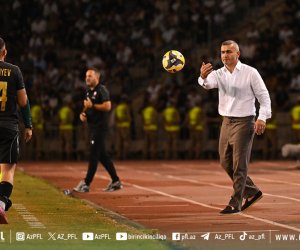

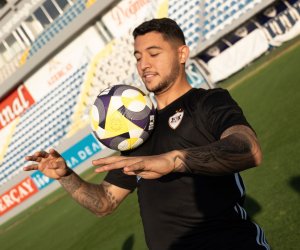
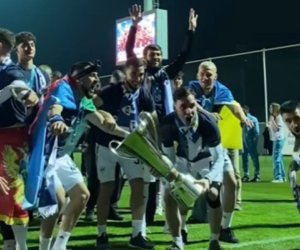
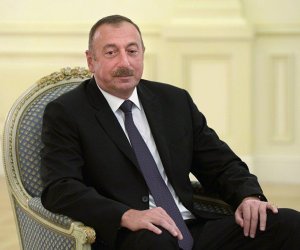
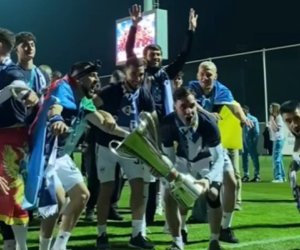
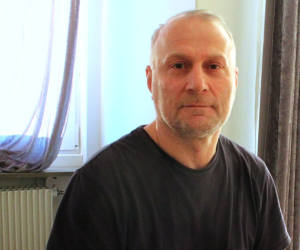


 Photo
Photo 



 Video
Video 

